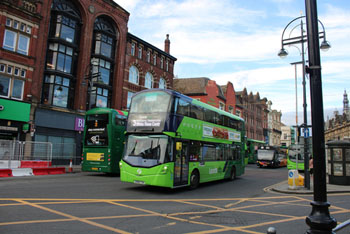Leeds City Council is set to scrap its Clean Air Zone (CAZ) plans after businesses switched to cleaner vehicles in anticipation, and could repurpose the scheme's vehicle tracking technology.
A joint review with central government concluded that the CAZ is no longer required after vehicles were switched ‘faster than expected’.
Leeds City Council has already written to the Government asking to keep £6.9m of CAZ funding to ‘lock in’ the full extent of air quality improvements.
The money would be used to continue offering grants to help local businesses switch to cleaner vehicles as well as to provide free licensing costs to drivers of less polluting taxis and private hire cars.
Leeds' executive board will meet next week to discuss an updated air quality strategy for early next year, including new targets aligned with stricter World Health Organisation guidelines.

Buses in Leeds last week
The council said it will be able to keep and repurpose the automatic number plate recognition (ANPR) camera infrastructure that had been installed to monitor and enforce the CAZ at a cost of several million pounds.
A spokesperson told Transport Network: ‘The ANPR cameras have varied functionality and can be reused to support the city’s traffic management, road safety and crime reduction ambitions. Options in this regard are currently being investigated.
‘Should repurposing be possible (both lawfully and without adversely impacting Council budgets) then officers will consider available options work to implement the change. Should there be cost implications it is proposed that the network of cameras remain in-situ (but not operational) for a further review into repurposing to take place during 2021. The cameras have an operational lifespan of eight years.’
The council said ‘in the unlikely event that air quality declined for any reason’, it could seek support from central government to introduce a CAZ, using the ANPR infrastructure.
The review found that more than 90% of buses and 80% of heavy goods vehicles driven in the city now use Euro VI engines and would not be charged if a zone was introduced. Nearly half of the city’s taxis and private hire cars are also now hybrid or electric.
In addition, pollution on key routes is below legal limits and not likely to exceed them again, ‘even if traffic were to return to normal levels or slightly higher’, while transport infrastructure improvements and the popularity of ultra-low emission vehicles are also improving air quality.
James Lewis, deputy council leader executive board member with responsibility for air quality, said: ‘When we consulted on the CAZ in 2018, we said that we hoped that no one would be charged because businesses would switch to less polluting vehicles before the charging system takes effect.
‘That is exactly what has happened. We have achieved the aims of the Clean Air Zone without having to charge a single vehicle.’
Register now for full access
Register just once to get unrestricted, real-time coverage of the issues and challenges facing UK transport and highways engineers.
Full website content includes the latest news, exclusive commentary from leading industry figures and detailed topical analysis of the highways, transportation, environment and place-shaping sectors.
Use the link below to register your details for full, free access.
Already a registered? Login